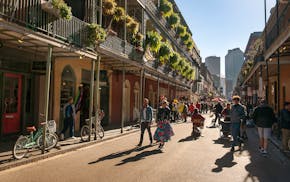Joyce Kilmer famously wrote, "I think that I shall never see/A poem lovely as a tree." Well, south Minneapolis has a tree that Kilmer would go nuts for.
It's the Little Free Poet Tree, located in front of Davin Haukebo-Bol's home at 4026 3rd Av. S. Affixed to an oak in the boulevard is a small, windowed box that contains notepads on which anonymous passers-by can record their poetic inspirations (it shares its name with a Shel Silverstein poem that begins, "Underneath the poet tree/Come and rest a while with me").
"The idea is for it to be about poetry. But people share what they're feeling, whether asking for help or saying they can be there for help. I guess you could make an argument that that's poetry in its own right," said Haukebo-Bol. "It does become a communication box, too."
He's referring to a message that popped up on the tree during the pandemic: "It's gonna be hard sometimes. But that's OK. Ask for help if you need or want it," along with a number to call.
The Poet Tree box was a gift from Haukebo-Bol's uncle, Tony Bol, who (along with wife Eden Penn) runs Share With Others, which encourages boxes for gifting a range of things with strangers (dog treats, health supplies, food) — along the lines of the popular Little Free Library movement founded by Bol's late brother, Todd. Tony and Davin installed the Poet Tree box in 2019.
"Occasionally, I write stuff and post it somewhere, or read things and get inspired by random poems," said Haukebo-Bol, a brewery event coordinator whose favorite poet is Emily Dickinson. "My uncle Tony reached out and said, 'I have this prototype little poetry box that maybe you'd be interested in.' He thought I would be a good steward for it."
Tony Bol was inspired by a tree, with poetry tacked to it, at a YMCA camp in Ely, Minn. When he saw the Ely tree, it occurred to him that sharing verse suits the Share With Others mission. Although Davin's was the first poetry box, since 2019, Tony has sent them all over the country.
"We have learned that some people use it for their own poetry and others have something they memorized and write it down to share. A few people have taken pages from old books of poetry and shared that. Others start a poem and seek others to fill in the blanks," said Bol. "The Little Free Poet Tree is a paintbrush for words and a prompt for poems that always gets its own following in the neighborhoods they share."
Haukebo-Bol has not met any of the poetry contributors to the tree, although he occasionally observes them from his sunroom. The idea of the Poet Tree also is that visitors can take poems with them, but Haukebo-Bol says many more poems are left than taken. (And it's not the only place in town where that can be done. Writer Alison McGhee has a little library she fills with poetry.)
"I don't look inside it every day but I try to take a look when I walk past, and it gives me a smile," said Haukebo-Bol.
He said the Poet Tree is fairly low-maintenance.
"I try not to curate the tree too much. I've seen times when people were getting out their aggressions, or using less appropriate words and I'll take those out. But for the most part, I let it be," said Haukebo-Bol, who enjoys the tree "from the human standpoint of observing and enjoying things and wanting to take pauses and appreciate it every now and then."
That's a very Joyce Kilmer-like sentiment and Haukebo-Bol knows it's shared by his neighbors, although he's not certain which neighbors.
"One way I know [the tree] has been well received by the community is it was missing some pencils and pens for a bit, and the paper was running low," said Bol, who admits those shortages were his fault. "I wasn't on my game with replacing it right away. But then I got a shipment, with a bunch of notepads and pencils and a note from an anonymous neighbor who said they wanted to help replenish the supplies."
What Haukebo-Bol hopes is that the tree can give passers-by a moment to reflect and, maybe, create.
"I have seen a range of attitudes in people, but the ones from kids always give me the biggest smile. I appreciate their simple observations of the day-to-day, which is what most poems are," said Haukebo-Bol. Having once hosted an open mic night at which verse was a staple, Haukebo-Bol lauds poets' efforts to find the perfect words to express whatever sentiment they're trying to capture.
"I really appreciate simple things, when you can say a lot with a minimal amount of words," said Haukebo-Bol. "A haiku would be a great example of that. A few syllables and you can tell the whole story of a walk through the woods."
Or of a south Minneapolis stroll, during which you encounter a tree where a stranger has left a few beautiful words.

Minnesotans find beautiful views, food and fun on trip to New Orleans via train
Ever wonder why the Northwest produces so many serial killers?

Embrace Minnesota's growing seasons at these 76 farmers markets

Old School Jewish Matchmakers offer timeless perspective on dating
